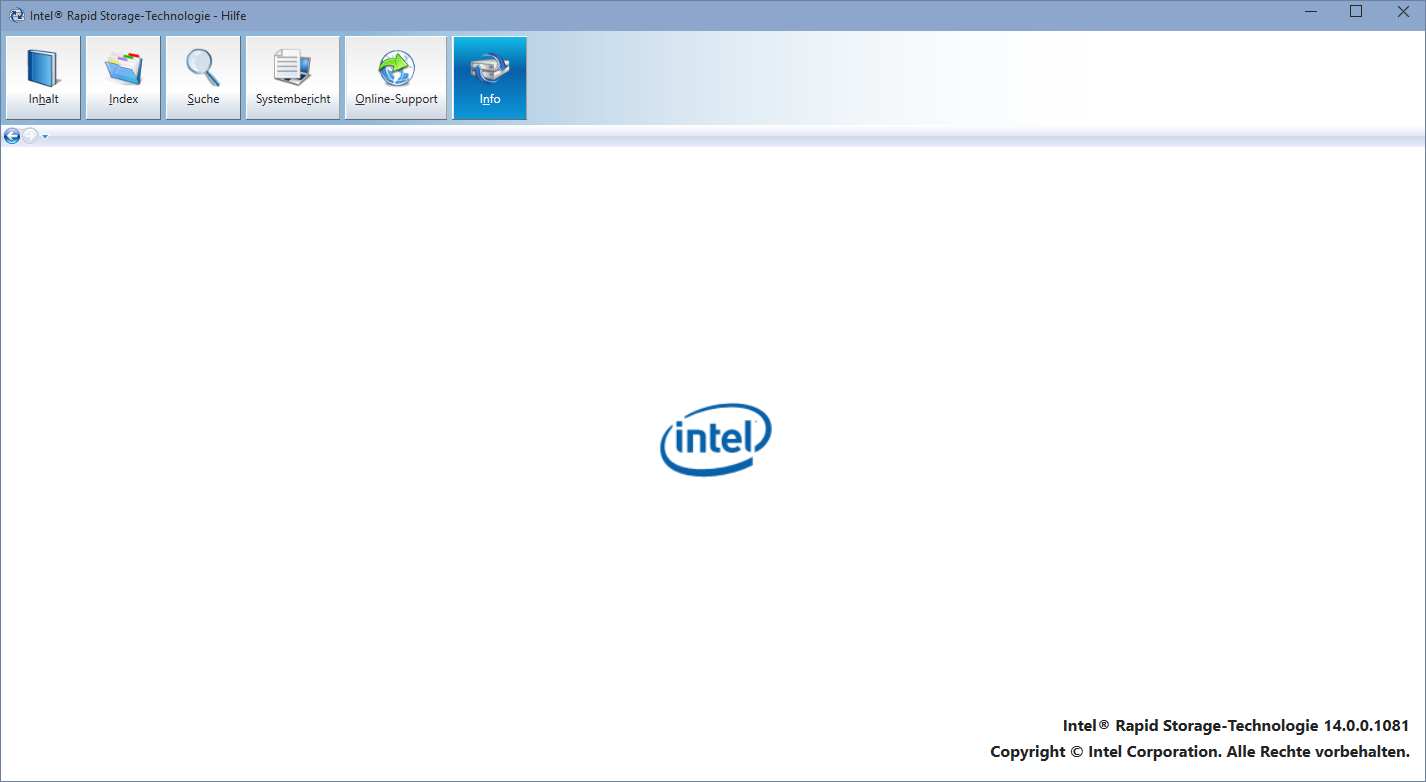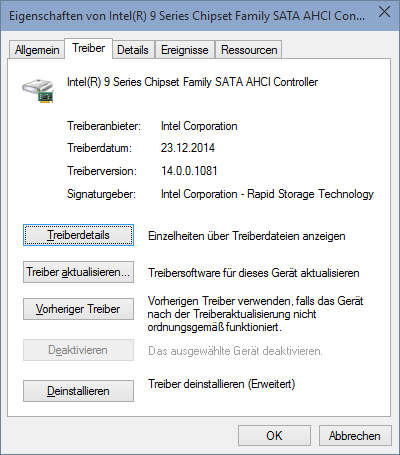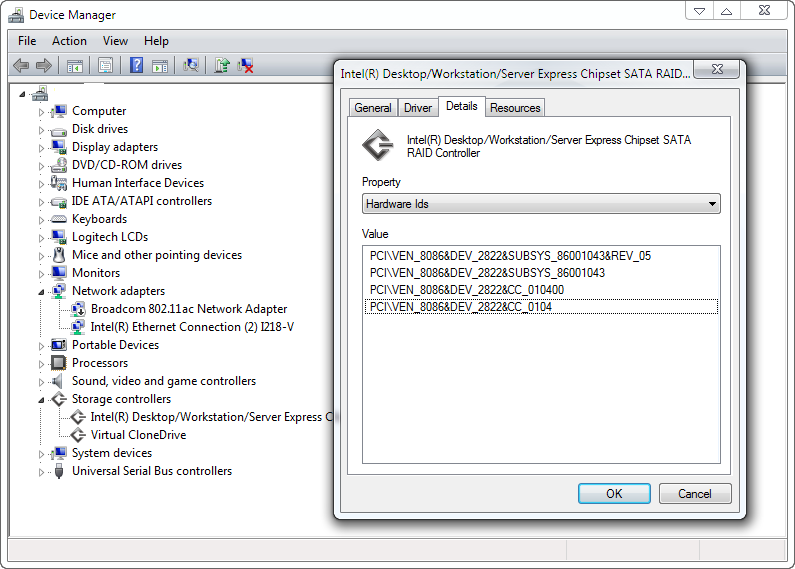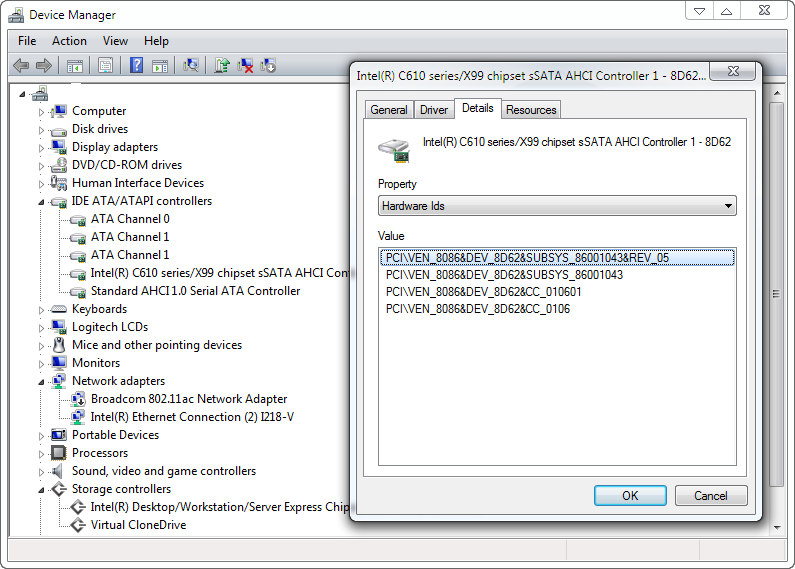You wrote: What does that mean? The Device DEV_2826 is an an on-board Intel SATA RAID Controller for Intel(R) C600 resp. C600+/C220+ Series Chipsets.
yes onboard. when windows 7 x64 is installed the driver is not iastor sys.
some kind of filter driver. perhaps this is right. but i’m unfamilar with it.
and yes i’ve tried v3xx & 4.xx drivers again only a filter driver installs.
rsteahci.sys & rstfltr.sys
its odd all if not most the drivers you post says except x79 which is basically my chipset. help
I’m begining to think that this rsteahci.sys is in my wim file and I have to remote it using dism…
ty again!
@ jschafer65:
Although your posts are not easy to understand, I suspect, that you
1. have an X79 chipset system,
2. want to create or have already created a RAID array in RSTe mode (some X79 mainboards offer the option to switch the Intel RAID Controller to an RST one > DEV2822) and
3. are going to create a personally customized Win7 x64 image for the later clean OS installation.
You obviously have tried to integrate wrong Intel RSTe drivers.
Look into the start post of this thread and download any of the offered Intel RSTe drivers v3.x.x.xxxx or v4.x.x.xxxx. You will not find any file named rsteahci.sys or rstfltr.sys within the packages.
This is only valid, if you would try to integrate any of the Intel RST drivers v11.x.x.xxxx, v12.x.x.xxxx or v13.x.x.xxxx.
My suggestion (provided, that you don’t want or don’t can switch the SATA RAID Controller to the RST mode within the BIOS):
Download, unzip and integrate the "64bit Intel RSTe RAID Driver v3.8.1.1006 WHQL for Win7 x64", which you can find within the start post of this thread.
At Station-Drivers I just found >here< a new 64bit Intel RST(e) driver v13.2.5.1012 WHQL dated 11/13/2014 (shown as being dated 10/30/2014).
Natively only Intel 8 -Series Chipsets are supported by the included AHCI drivers. A 32bit variant is not yet available.
Here is he direct download link:
Thanks to Station-Drivers for the source package!
Am I the only one who always gets confused with the name of RST(e)? If there is no number near it (like v13 or v4) I won’t be able to tell what the name represents.
My opinion: If Intel calls the consumer branch RST then why change it? The inclusion of the extra filter happened a long time ago now and it doesn’t really mean that these drivers are based on the enterprise RSTe ones. Just that Intel decided to follow the same path for both releases. So I suggest to leave the consumer releases as RST and the enterprise ones as RSTe - the way that Intel names them which causes absolutely no confusion. Regarding the filter, any drivers before 11.5 can be called legacy RST or something and Matrix can be called IMSM (again, per Intel spec).
My opinion:
- It was Intel’s mistake not to rename the RST drivers from v11.5 up. Intel RAID users, who ever tried to "downgrade" from an Intel RAID driver v12/v13 or v3/v4 to a "classical" RST driver like the v11.2.0.1006, know what I mean. Just to make clear the big functional differences between the newer RST drivers v12/v13 and the older RST v9/v10/v11.2 ones, I named the newer ones RST(e) drivers.
Note: The "Enterprise Edition" RSTe drivers v3/v4 have the same names (iaStorA.sys resp. iaStorF.sys) as the "new" RST drivers from v11.5 up. Both RST driver development lines (RSTe and "new" RST) work absolutely the same way, whereas the "classical" RST drivers (latest: v11.2.0.1006) work totally different (without SCSI Filter). - From today’s perspective it probably was a big mistake done by Intel to have stopped the "classical" RST development line and to add an SCSI filter driver. They added the iaStorF.sys to get the TRIM command passing the Intel SATA RAID Controllers into the RAID array of the latest Chipsets.
Reasons:- As CPL0 aka Dufus has verified, no SCSI filter driver is required to get TRIM in RAID0 support for all Intel Chipset Southbridges from ICH8R up.
- The newest Windows Operating Systems since Win8 neither load nor use the SCSI filter driver iaStorF.sys.
Alright, I totally understand that. All the things you said are true, it’s just that Intel doesn’t take into consideration (no testing) of RST driver downgrade. So theoretically and with no downgrading all users back then updated from legacy RST to “new” RST once (11.2 -> 11.5 or up) with no issues. What happens when going back (downgrading) does not seem to concern Intel.
However, all these aside, I’m not sure I understand how this answers my concern with counter arguments. Since the RST and “new” RST drivers are still named RST by Intel, why not have:
MSM (for Matrix)
Legacy RST (after Matrix up until 11.2)
RST (consumer 11.5 and up)
RSTe (enterprise)
EDIT: I am not blaming you for the naming scheme, it’s just a conversation. 
Your arguments cannot really convince me, because the last 2 groups have exactly the same structure and functionalty. "RST (consumer 11.5 and up)" and "RSTe" are "Enterprise" drivers, because both of them contain the additional SCSI filter driver.
Don’t worry, I didn’t feel blamed by your suggestion to rename the "RST(e)" drivers to "RST" within my guides and statements. Contrary to that: It is good to have such discussions, because there are often different point of views regarding the exactly same fact.
How can RST be a set of “Enterprise” drivers if it targets completely different platforms? The method the driver works is the same (structure) but not the content (functionality). Unless the RST drivers have the same .sys & .inf files as RSTe (which they do not), they are not both Enterprise. Otherwise there would be no reason to call them differently or have two releases in the first place.
I asked this question to avoid confusion, no other reason. In the end, what benefit does it give to a new user who is looking for updated drivers & oROMs? Since guests don’t usually care exactly how something works as long as it works and it’s updated, this visual distinction may confuse.
The first Intel AHCI and RAID drivers named iaStorA.sys and iaStorF.sys were the RSTe v3.0.0.1086 Beta ones, which were released in June 2011. Intel named them "Rapid Storage Technology Enterprise Edition" (RSTe) because of their new structure (2 totally new drivers instead of the "classical" iaStor.sys) and functionality (all HDDs were now addressed as SCSI drives). In July 2011, that means just 1 month later, Intel released the RST drivers v11.5.0.1109 Alpha, which had exactly the same structure and functionality as the previously presented "Enterprise Edition" drivers v3.x.x.xxxx.
By the way: The reason for the complete changement of the driver structure and the introduction of an additional SCSI filter driver was the "Enterprise" to get TRIM activity into the RAID0 array. Intel believed in summer 2011, that only the UNMAP command, but not the TRIM command is able to pass the Intel SATA RAID Controllers into a RAID array. Since the Window OS Windows 7, which was the latest at that time, didn’t support the UNMAP command, they added the SCSI filter driver iaStorF.sys to switch the TRIM into an UNMAP command.
They have the same functionality (see above). The only difference is, that they have been designed for AHCI/RAID Controllers with a different DeviceID.
There was no reason to name them differently, but Intel did it nevertheless. Maybe they just wanted to point out, that they had developed something particular for their High-End Chipset X79 - special "Enterprise Edition" drivers.
Interesting, I admit I didn’t know all these details. So, the RSTe tree started from v3? There was no v1 or v2? Weird move by Intel. So besides a different DEV_ID what’s the difference between the two trees (RST and RSTe)? I know some X79 and X99 boards have an option to work with the RST DEV_ID so yes it seems logical that both of them are very similar. That does raise the question though, why a new tree? There must be a benefit of running at RSTe instead of RST, maybe the OEM documentation explains this.
Regarding the naming scheme, thing is that the title RST(e) for the RST drivers/oROM is only seen in this forum and not at Intel or elsewhere.
Fernando, I am not sure if you know and are aware about this but the Intel Rapid Storage Technology v13.2.4.1000 WHQL
release is compatible with the X99 platform without any driver modding necessary to make them work.
I didn’t even realize this myself until a member over on the ASUS ROG forum site posted a link to
them in a topic another member created.
Your first post in this thread that contains the info and download for the Intel Rapid Storage Technology software+driver
mentions only the Intel 8- and 9-Series Chipsets are suported by the Intel Rapid Storage Technology version 13.2.4.1000.
Yes!
No, and there will never be an RSTe v5 line, because the old MSM development tree started with v5.0.
You should ask Intel. For me it never made any sense to start a new driver development string for Intel’s "High-End" Chipset X79 and its successor X99. The X79 and X99 mainboards are much more expensive than those with a "normal" Intel Chipset, but the driver support by Intel for the X79 and X99 Chipsets is a disaster, especially for RAID users. The mainboard manufacturers tried to help by switching the DeviceID support from DEV_2826 to DEV_2822 by modding the mainboard BIOS.
I only see disadvantages.
Intel prefers to hide the similarities between their "High-End" RSTe drivers v3/v4 and the "normal" RST drivers v12/v13.
Example: Although Intel recommends for their "High-End" C600/C600+ Series Chipsets to use the RSTe drivers v3/v4, the "Intel(R) C600 Series Chipset SATA AHCI Controller" is fully supported by all "normal" Intel RST drivers from v11.6.0.1030 WHQL up to v13.1.0.1058 WHQL. As you can see below, the officially released Intel RST drivers v13.1.0.1058 WHQL do fully support X79 and X99 Chipsets running in AHCI mode and are usually working better than the RSTe ones.
No, you obviously mixed the driver version.
It are the Intel RST(e) drivers v13.1.0.1058 WHQL, which natively do support the X99 platform Intel SATA AHCI Controller with the DeviceID DEV_8D02.
Interesting detail:
Intel has hidden the support of the X99 platform by giving the related Controller a wrong and absolutely misleading name:
The normal name of the X99 Chipset AHCI Controller is "Intel(R) C600+/C220+ Series Chipset SATA AHCI Controller", but Intel has added the DeviceID DEV_8D02 into the iaAHCIC.inf file of the 32/64bit Intel RST(e) drivers v13.1.0.1058 as "Intel(R) 9 Series Chipset Family SATA AHCI Controller".
Look here:
By the way: The Intel RST(e) drivers v13.1.0.1058 WHQL do not support any C600/C600+ Series Chipset like X79 and X99, if the SATA Controller has been set to RAID mode and the BIOS has been set to "RSTe mode".
This information is correct regading the Intel RST(e) drivers v13.2.4.1000 WHQL, but I missed the additional X79 and X99 AHCI support regarding the Intel RST(e) drivers v13.1.0.1058 WHQL. I just have updated the start post regarding this point.
Thank for for the info!
At Station-Drivers I just found brandnew Intel RST(e) drivers v14.0.0.1081 Beta dated 01/09/2015 and the related RST Software dated 01/13/2015 (look >here<).
Wait some minutes until I have finished the uploads!
EDIT: Done!
@ all:
Update of the start post
Changelog:
- new: 32/64bit Intel RST(e) drivers v14.0.0.1081 Beta dated 01/09/2015 (shown within the Device Manager as being dated 12/23/2014)
- new: Intel RSTe Drivers & Software Set v14.0.0.1081 Beta dated 01/13/2015
The included AHCI/RAID drivers are digitally signed by Intel and are usable with all Windows Operating Systems from Win7 up. These are the first RST(e) drivers, which already support the upcomng Intel Skylake platform (Intel 100 Chipset Series), but Intel 8- and 9-Series Chipsets are fully supported as well.
Meanwhile I have installed the 64bit driver and the related RST Software onto my Z97 AHCI system and didn’t yet realize any problem.
This is what the Device Manager and the new RST Console Software v14.0.0.1081 shows:
[[File:RST(e) Driver v14.0.0.1081.png|none|auto]]

Interesting detail: This is the first driver I have seen, where the 32bit driver (1.912 KB) is bigger sized than the 64bit driver (1395 KB). Usually it is vice versa. Maybe someone of our Forum Gurus can explain it.
EDIT: The results of a first benchmark test using these brandnew Intel RST(e) drivers v14.0.0.1081 can be found >here<.
Have fun with these brandnew Intel AHCI and RAID drivers!
Dieter (alias Fernando)

Fernando, how come then I can install the Intel RST(e) drivers v13.2.4.1000 WHQL drivers without any
additional driver modding needing done to get them to work?
My board is a ASUS Rampage V extreme X99.
This board has Intel controllers with with DeviceID Device ID 8086-2822 and Device ID 8086-8D62
Unless I just misunderstand something?


According to your attached screenshots you actually are using simultaneously 2 different Intel SATA Controllers, one in RAID and the other in AHCI mode:
- The "Intel(R) Desktop/Workstation/Server Express Chipset SATA RAID Controller" has the DeviceID DEV_2822 (which means, that it has been set to "RST mode"). Such SATA RAID Controllers are natively supported by all Intel RST drivers from v9.5.0.1037 up to v14.0.0.1081.
- The "Intel(R) C610 Series/X99 Chipset sSATA AHCI Controller" is an sSATA AHCI Controller and has the DeviceID DEV_8D62. None of the sSATA Controllers is supported the Intel RST drivers. The only driverpack, which I know to support sSATA Controllers like yours, is the RSTe v4.1.0.1046 one.
I take it if I am primary using the "Intel(R) Desktop/Workstation/Server Express Chipset SATA RAID Controller" which has the DeviceID DEV_2822, then I should have no issues upgrading to newer RSTe drivers?
You cannot "upgrade" from an RST to an RSTe driver as long as your BIOS has been set to "RST RAID mode".
You cannot "upgrade" from an RST to an RSTe driver as long as your BIOS has been set to "RST RAID mode".
I see now. so the Intel® Rapid Storage Technology drivers work both in RST or RSTe? and in my case, there are being
installed as normal RST because of that way I have setup my computer, because I am using a RAID configuration?
You are obviously using an RSTe driver (for your Intel sSATA Controller) and an RST driver (for your Intel RAID Controller).
Yes, but only regarding the Intel RAID driver.
